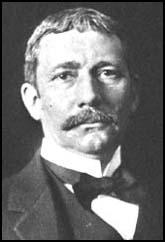Elihu Root

Elihu Root was born in Clinton, New York, on 15th February, 1845. After graduating with a law degree from New York University in 1867 he became a leading corporation lawyer. He also served as U.S. attorney for the southern district of New York (1883-85). An active member of the Republican Party, Root became a legal adviser to Theodore Roosevelt.
In 1899 President William McKinley appointed Root as his secretary of war. After the assassination of McKinley, Root served under Theodore Roosevelt. He reorganized the United States Army and established a governmental system for Cuba, Puerto Rico and the Philippines.
After leaving the post in 1909 Root was elected as a Republican Party senator for New York. The following year he became president of the Carnegie Endowment for International Peace. He received the Nobel Peace Prize in 1912 and after the First World War was a staunch advocate of the League of Nations.
Elihu Root died on 7th February, 1937.
Primary Sources
(1) Elihu Root, speech (25th January, 1917)
The President has recently made a speech in the Senate, which we have all been reading, and I wish you to observe that the only way he sees out of the war that is devastating Europe is by preparation for war. There is much noble idealism in that speech of the President. With its purpose I fully sympathize. The kind of peace he describes is the peace that I long for. But the way he sees to preserve that peace is by preparation for war. Now, if some of our friends among the cornfields and the cotton fields and the mines and the citrus-fruit orchards will sit up and read this clause of the President's speech, telling how we may prevent further wars, they may have reason to wonder whether they have not forgotten something. Here it is:
"Mere agreements may not make peace secure. It will be absolutely necessary that a force be created as a guarantor of the permanency of the settlement so much greater than the force of any nation now engaged, or any alliance hitherto formed or projected, that no nation, no probable combinations of nations, could face or withstand it. If the peace presently to be made is to endure, it must be a peace made secure by the organized major force of mankind."
Now, I hope that paragraph means what I hope it does. I do not understand it as intended to commit the United States to enter into a convention or treaty with the other civilized countries of the world which will bind the United States to go to war on the continent of Europe or of Asia or in any other part of the world without the people of the United States having an opportunity at the time to say whether they will go to war or not. There would be serious difficulties, I think insurmountable obstacles, to the making of any such agreement. One is, that agreement or no agreement, when the time comes, the people of the United States will not go into any war, and nobody can get them into any war unless they then are in favor of fighting for something. And nothing can be so bad as to make a treaty and then break it. What I understand by it is that a convention shall be made by which all the civilized nations shall agree with all their power to stand behind the maintenance of the peace thus agreed upon; and, if that peace be infringed upon, then each nation shall determine what it is its duty to do under the obligation of that agreement toward the maintenance of that peace.
But observe that that is worthless, meaningless, unless the nations that enter into it keep the power behind it. It will be worthless agreement on our part if we have not a ship or a soldier that we can contribute to the war, if war there ought to be, for the maintenance of that peace. And it absolutely requires that we shall build up a force, a potential power of arms, commensurate with our size, our numbers, our wealth, our dignity, our part among the nations of the earth.
There is just one other sentence of this speech about which I wish to say a word, and that is the declaration that the peace must be a peace without victory. Now, I sympathize with that. But the peace that the President describes involves the absolute destruction and abandonment of the principles upon which this war was begun. It does not say "Serbia," it does not say "Belgium," but there the chosen head of the American people has declared the principles of the American democracy in unmistakable terms; has declared for the independence and equal rights of all small and weak nations; has declared for a Monroe Doctrine of the whole world precluding all nations from interfering with the independent control of its own affairs by every small nation, from taking away the territory of other nations, from attempting to exercise the coercion of superior power over other nations, for disarmament, for the reduction of these mighty armies and navies. And every word of that declaration, which I believe truly represents the conscience and judgment of the American people, denounces the sacrifice of Belgium and of Serbia and the principles upon which they were made.

